If you’re a CTO, VP of Engineering, or other IT decision-maker, considering setting up a dedicated development team, you’re in the right place.
In this article, we’ll help you not only work out if it’s the right path for your company but also how to set one up. We’ve even dropped in some tips on how to manage your team once it’s in place, drawn from what we’ve learned from building more than 130 teams over 10 years and honing our unique model.
What is a dedicated development team?
A dedicated software team is a complete group of software engineers that is managed by a third party for a client organisation. Unlike outsourcing, a dedicated team works exclusively for the client as a part of the company. The third party oversees operations on the ground such as payroll, equipment, and in some cases engagement.
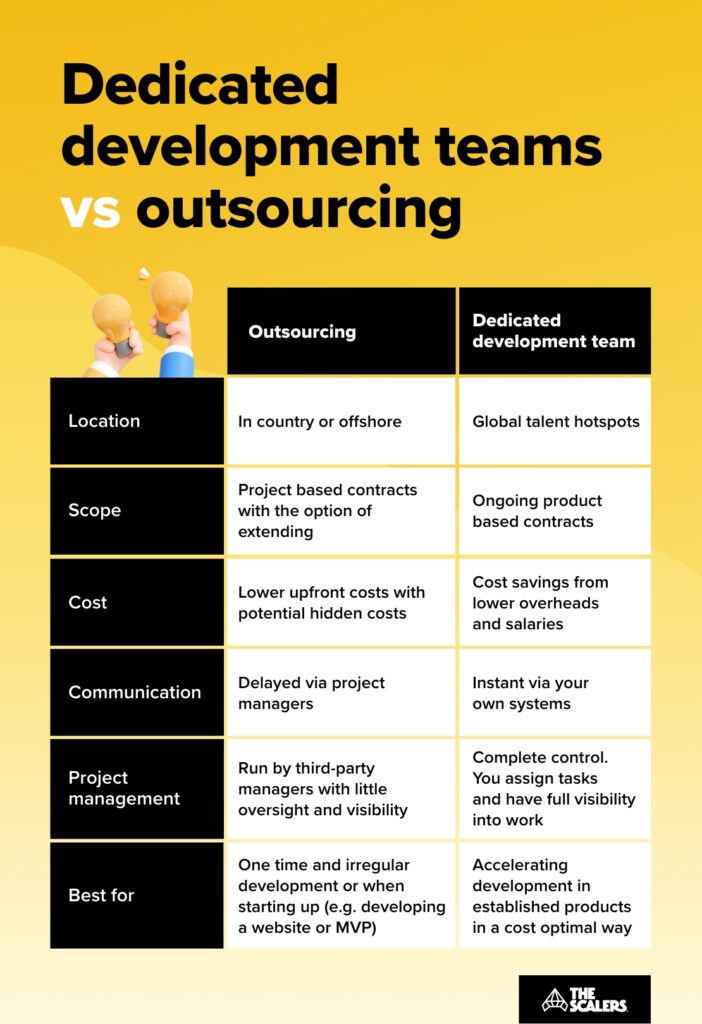
What does a dedicated software development team consist of?
A typical dedicated software development team may consist of the following roles:
- Software Engineers/Developers. Frontend, backend, or full-stack developers who write the code.
- Senior/Lead Developers. Experienced developers who guide technical decisions and mentor junior team members.
- Solution Architects. They design the overall technical architecture and ensure scalability.
- DevOps Engineers. These specialists handle deployment, infrastructure, and continuous integration/delivery.
- Quality Assurance (QA) Engineers. Responsible for ensuring software quality through testing and automation.
- UI/UX Designers. Creative professionals who design user-friendly interfaces and optimise user experience.
- Data Engineers/Scientists. The team members that handle data processing, analytics, and machine learning implementations.
- Project Manager/Scrum Master. The manager who coordinates project activities and ensures timely delivery.
- Technical Lead. A very experienced manager in charge of bridging communication between business requirements and technical implementation.
- Business Analyst. The person responsible for translating business needs into technical requirements.
Keep in mind that you have the final say on the structure of your dedicated software development team. For example, you can start with just a few developers and add more senior or leadership roles as your company and product grow.
Key benefits of a dedicated software development team
Setting up a dedicated development team can bring many benefits to your business that other models can’t offer:
- Access talent you can’t find locally. Many regions face serious developer shortages, especially in in-demand technologies. Dedicated teams are often based in tech hubs like Bangalore or Warsaw, where top engineers are more available.
- Cut costs without cutting quality. You’ll save on overhead and operational expenses while accessing specialised skills that might be unaffordable in your home country.
- Gain complete visibility and control. You communicate directly with your team members and manage daily operations yourself. You’re in the driver’s seat with full product oversight and workflow control.
- Boost engineering productivity. Dedicated developers focus solely on your project, not juggling multiple clients. This typically results in higher-quality work delivered on time.
- Minimise risks and knowledge loss. Dedicated teams stay with you long-term, eliminating the constant turnover that plagues many outsourcing arrangements. Your developers learn your business intricacies and work under strict confidentiality agreements to protect your IP.
When should you consider the dedicated development team model?
There are a few common signs that you should get a dedicated team extension. It’s unlikely you’ll experience all of them, but if you notice one or two, that’s a solid indicator that you should investigate further.
- You’re struggling to find local talent to fill your open positions.
- Your existing team lacks specific skills and expertise.
- Your local developers are unmotivated.
- Wage inflation is causing you to overspend to stay local.
- You’re unable to scale your development operations.
- You’re spending too much time hiring and sorting out HR rather than focusing on your core responsibilities.
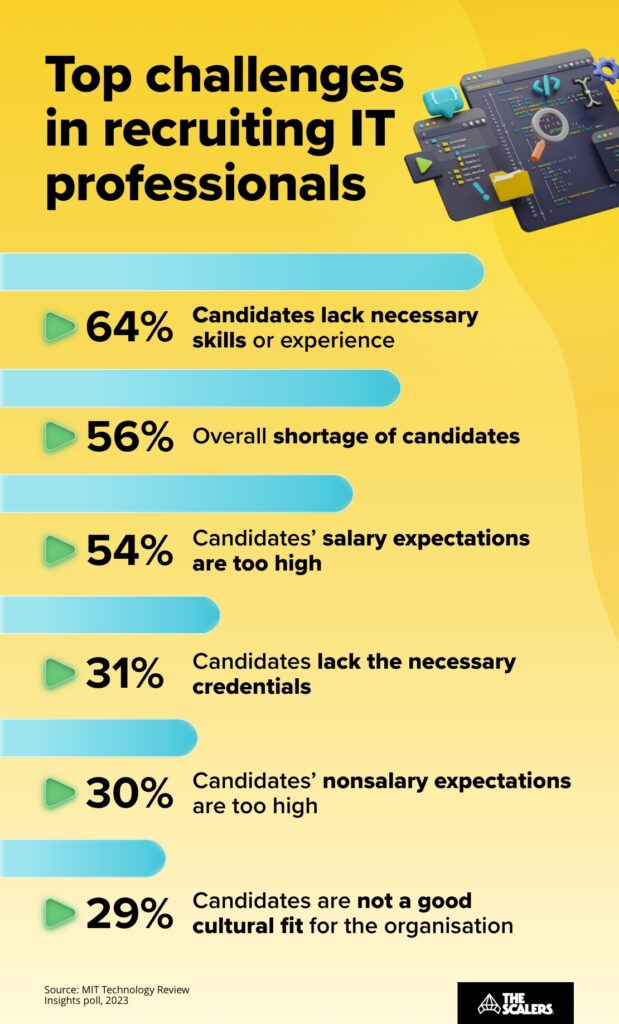
Common dedicated development team services
Whatever product you are developing that requires development, you can set up a team to help deliver it and ensure it is fit for purpose. But some services are more common than others, including:
- Web development.
- Mobile app developmen.t
- DevOps.
- DataOps.
- Cloud services.
- AI/ML specialists.
- SAP and ERP services.
- UI/UX and product development.
- Security engineers and cybersecurity.
- Salesforce and Microsoft Dynamics developers.
- Quality Assurance and test automation services.
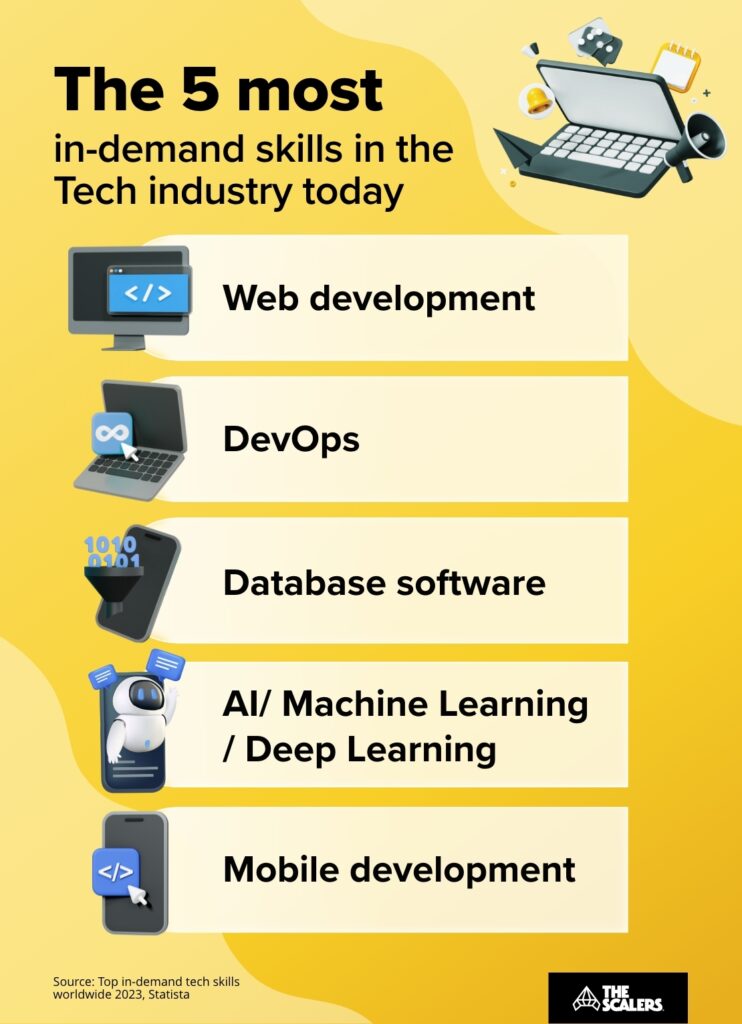
Team extension vs dedicated software teams: what’s the difference
Software team extensions and dedicated teams have a lot in common. They both give you full control over the dedicated team of developers, have employees provided by a third-party partner, and are often in offshore locations rather than local ones. But there’s one key difference.
A team extension supplements your existing development team, whereas a dedicated team is a complete team.
So which should you choose?
Well, if you only need a few software engineers, analysts or QA testers to supplement your existing setup, a team extension is right for you. But if you want to build a new product or accelerate your product roadmap with an additional scrum team, a dedicated software team is the right choice for you.
What influences the cost of dedicated development teams?
The costs of dedicated development teams can vary depending on several factors. The first one is an obvious one: the location of the team. It’s not the same as building a dedicated team in a region with a higher cost of living, like Poland, than in India or the Philippines.
Then, there’s the specialisation of the engineers or professionals that compose your team. Those who have in-demand skills or are proficient in niche technologies may have higher salaries than other developers.
There’s also a factor that is often overlooked and that’s the quality of the offshore development partner you collaborate with to build your team. Generally, a high-quality partner will charge more for its services, but you get top, cost-effective services in return.
Here’s where “cheaper” partners cut corners: they operate from substandard offices with frequent power outages, pay below-market wages, leading to high turnover, and overwork developers who end up producing buggy code. Many also hand out senior developer titles to inexperienced engineers, leaving you with a team that lacks the expertise you need.
How to hire a dedicated software development team
If you’ve got this far, there’s a good bet that you’ve discovered this is the right model for expanding your development operations and now it’s time to hire your team. But how do you start?
Simple — follow these simple steps.
Define your needs
Before you kick off your search, you need to establish your requirements.
If you don’t, you risk drifting from your intentions, settling for a substandard provider, or making a decision based on your gut.
Make sure to note:
- Your reasons for building a team
- What their responsibilities will be
- How they will interact with existing teams
- What technologies and skills they will need
- Whom they will report to (and if any managers are needed in the team)
- And anticipating how the team may expand in the future
- How you will evaluate if the team is a success or not
During the process, you may change your mind, but having it documented at the start will ensure that you do so intentionally, keeping your key goals and priorities in sight, not accidentally.
Source potential partners
Once you know your requirements, it’s time to find a partner to fulfil them.
The trick is to keep your options open and cast your net as wide as possible at the start — you can always eliminate candidates later.
Don’t just rely on Google. Ask associates in your network for any recommendations they have. Go to trade events and see who is presenting there.
Once you’ve got a large list, you can start evaluating and eliminating them.
“Negotiation is not an act of battle; it’s a process of discovery. The goal is to uncover as much information as possible.”
Establish how each partner is different
Not every partner is the same.
They operate in different locations, they manage teams in distinct ways, and some have fundamentally unique models that can be the difference between success and failure for your offshoring project.
Find out what they claim is different about themselves and how they back that up.
Verify their expertise and credentials
We’re sorry to say it, but there are some real cowboys out there.
They make big claims like being able to find the best engineers or offering the same quality of service at a fraction of the cost of others. But once you sign on the dotted line, you discover the truth.
Give yourself the best shot at avoiding that misfortune — do your research.
Look at the companies they’ve worked with in the past. If they have case studies, check the details of how they work. Explore their testimonials and see what others say.
However, the best thing you can do is reach out to executives who worked with them in the past. They’re more likely to give you an honest opinion that might not have made it online.
If you come across any red flags at this stage, remove them from your search.
Evaluate how they communicate
Communication is key for a good partnership.
It’s also one of the central benefits of using a dedicated team over traditional outsourcing offerings. When your in-house team can work alongside your offshore team, using the same systems and processes, you have complete ownership of the development process and can be truly agile.
And when problems arise (and that is when, not if), you need to be able to get in touch with your partner and get it sorted ASAP.
So get in touch with the partner to get a pitch and use this as a testing ground. Pay attention to:
- How quickly they respond.
- How clearly do they communicate information.
- If they clarify points of confusion or act as “yes people”.
- If they avoid difficult topics or aren’t ready for questions about security and their processes
Don’t just pay attention to the information they convey, but how they communicate.
Receive a tailored proposal
By this point, you should be in touch with at least a handful of potential partners and have provided your requirements.
A good partner will produce a pitch based on exactly what you requested. A great partner will offer their own insights into the local talent pool to help you find the best option for your needs.
Either way, you’ll soon be receiving a proposal for your needs.
Accept the best offer for your needs
The time has come.
You’ve collected a set of offers from different offshoring partners and now you can make your final decisions.
Sometimes the choice is obvious, but more often than not, you’ll have to pick between different advantages. There are no easy answers or guarantees but the adage of “You get what you pay for” is true here as well.
But accepting the offer is only the start.
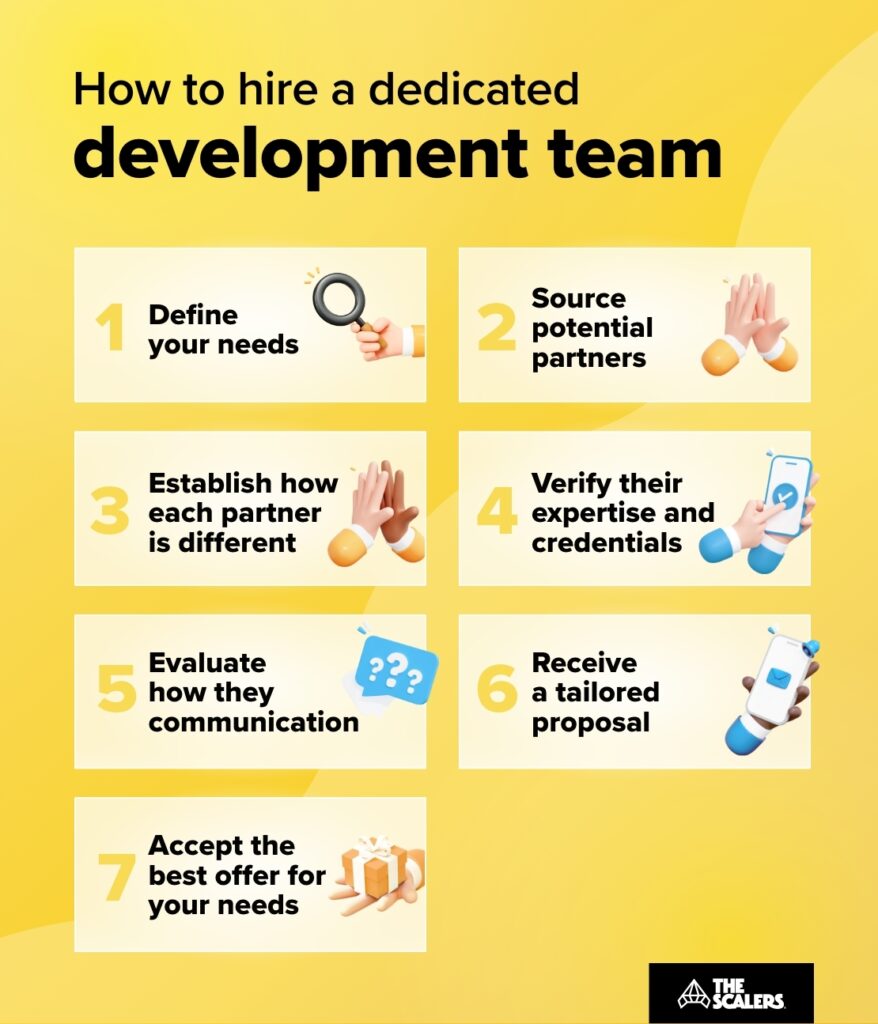
How to manage a dedicated development team
Once you’ve got an offshore team in place, you’ll need to make sure you can collaborate effectively.
After all, if you’ve got a quality team but poor processes, you won’t get the best out of them (and you might even slow production down) — all because of poor management.
Here are the key lessons we’ve learned from helping set up and manage more than 130 teams for our partners over the last 10 years.
Onboard them into your systems and culture
The key to a successful dedicated development team offshore is to treat them the same as your in-house teams. And that starts with onboarding.
Give them access to the same systems and processes as your local team. By using the same systems, you have complete transparency between teams, helping to avoid tech debt and conflicts caused by siloed work.
But more than just the systems, you have to explain your ways of working and the culture in your company.
While your partner should have evaluated for cultural fit while building the team, instilling these expectations and processes helps ensure they are lived from day one.
Share the big vision
When you treat employees as dumb robots who blindly carry out orders, that’s how they’ll act.
But when you treat them as skilled experts with valuable ideas and contributions, they’ll rise to the challenge.
And this starts with sharing the big vision of our company and product.
Once they understand what they are working on, why it matters, and the mission and values of the company, they can bring meaningful additions to the product.
Bridge cultural gaps
Different cultures can bring conflicts, but also unique perspectives.
When we expect everyone to think and operate the same as we do, we can end up causing unnecessary stress on ourselves and being less productive.
Learning about cultural differences and communication preferences can help us overcome these differences and even benefit from other approaches.
Treat your offshore team like your in-house one
If you want to cause tension between your in-house and dedicated teams, treat them differently.
It’s almost guaranteed to breed resentment between them and cause barriers to form.
While you’ll never be able to do exactly the same activities, at the same time with each team, you can still treat everyone with respect and offer them a great place to work with engaging activities, appreciating their contributions:
- Celebrating personal achievements and milestones
- Recognising contributions in the workplace
- Organising regular celebrations and engagement activities
These are just a few ways to help employees feel valued. If you’d like more insights, check out this series on how to engage employees.
Find knowledge-sharing opportunities
When you build an expert team, you have a wealth of insights, experience and knowledge in your workplace.
And sharing those insights can help both those sharing and those learning to continue developing.
Running activities between different teams, including across borders, can not only lead to shared insights but also help appreciate the knowledge of other teams and encourage further collaboration.
Now the you know everything about how to build and hire a team, the next thing is to define your requirements and start sourcing potential partners. And here is the perfect place to start.
Why you should consider The Scalers for building dedicated development teams
At The Scalers, we specialise in building dedicated teams that work just like your in-house software development teams.
Unlike other providers, we build teams to your exact specification rather than allocating employees from a bench. This means that we can find the top 2% of software engineers, developers, and managers with the right cultural fit for your organisation.
The net result is highly skilled and engaged teams who stay 2x longer than employees in Western countries (and in the most cost-optimal package too).
It’s a real win-win for everyone where you get great employees for less, and employees are treated the same way as Western employees, and make value-adding contributions on challenging projects.Check out our model if you’d like more details on how our unique approach works.
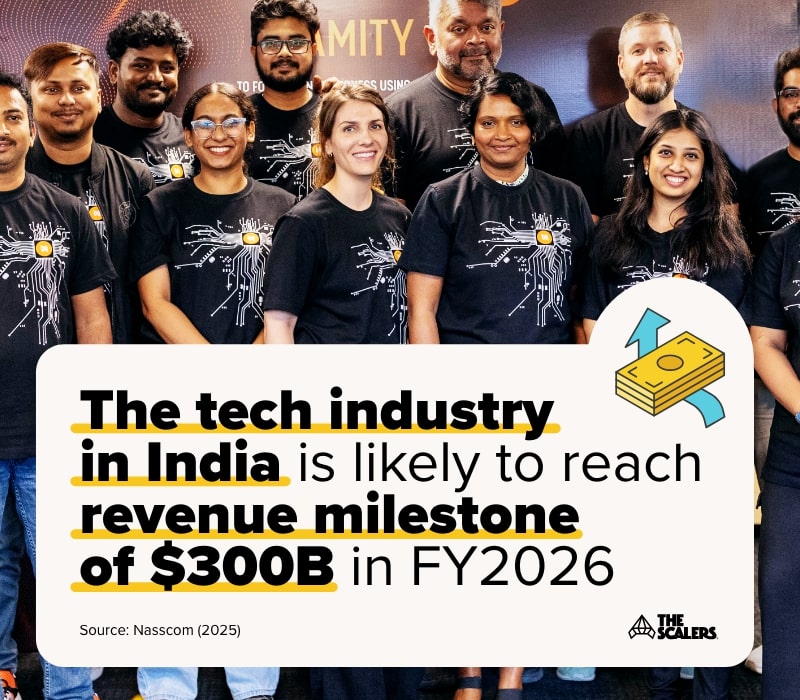
Dedicated development team examples
Since 2014, we’ve set up more than 130 teams for partners around the world.
Here are a few examples to help you imagine what one might look like for your company:
- Preqin is a UK FinTech that wanted to rebuild its flagship product. The results from their scrum teams were so impressive that they kept expanding till they had an R&D centre with more than 450 employees.
- Nextpoint was struggling to find specialists in the US for its unique tech stack. They partnered with The Scalers to set up their Bangalore office and gained an 11-person team to accelerate their product development.
- Hesus wanted to drive the digital transformation of their construction company but didn’t have the capacity at home. The Scalers assembled a team of web development specialists who architected, launched and constantly updated the Hesus store.
But it’s not just tech companies.
The value The Scalers deliver is long term — Mediolanum Bangalore is an extended part of our team, not individuals disconnected in a different part of the world. It’s been fantastic and much smoother than I could have imagined.
One Australian marketing agency was struggling to find Salesforce and Magento developers to help set up their campaigns. They had previously used an outsourcing partner in the Philippines but found the results sub-standard, and the delays in communication were harming their reputation with clients.
They turned to The Scalers to set up a dedicated team in Bangalore. Now, they have their own team with whom they interact directly, which has allowed them to accelerate time to value for their clients.For more examples, check out our case studies.
Ready to get started?
If you’ve read everything so far, then we have some good news. You have all the information you need to set up a value-adding dedicated offshore development team for your organisation.
And while there are many options for partners out there, we’d love for you to get in touch and check if we’re the right partner for you. We’ll bet that you won’t be disappointed.
Key takeaways
-
1
A dedicated development team is an offshoring model where a partner sets up a complete development team that works exclusively for your company.
-
2
These teams can fulfil any software development services your company needs as long as they have the required members.
-
3
Signs that you should set up a new team include if you can’t find local talent, skills gaps in your current team, high local wages, and spending too much time on recruitment and HR tasks.
-
4
Finding a good partner is essential for a successful dedicated team and requires evaluating their experience, communication, and model.
-
5
Effective management of your team involves treating them the same as a local team and leveraging modern communication tools for effective communication.
If you’d like to learn more about how to build high-performing offshore teams, download our free guide on transitioning from outsourcing to offshoring.
FAQs
A fixed-price model locks in scope, budget, and deadlines upfront. It’s best for short, well-defined projects. A dedicated team provides you with long-term flexibility, deeper collaboration, and the ability to adapt as your needs evolve.
The timeline depends on your needs and the engagement model you use to build your team. Partnering with a reputable offshore partner like The Scalers can fast-track the process, often enabling you to onboard top engineers within a few weeks.
You manage the team directly, just like your in-house staff. You set the priorities, processes, and tools.
We build your team from scratch or scale your existing one. You get full-time engineers aligned to your goals and company culture.
Costs depend on team size, tech stack, and location. With The Scalers, you get elite talent at cost-effective offshore rates.
Most teams start with as few as five engineers. You can scale up as your product and business grow.
High developer turnover, poor communication, lack of accountability, or unclear pricing are common warning signs. A reliable partner should provide stability, transparency, and consistent technical quality.
Build Your Team,
Not Just a Contract
With The Scalers’ offshore dedicated development team, you get engineers who join your workflow for the long run. Grow steadily, stay flexible, and work with people who care about the product as much as you do.







